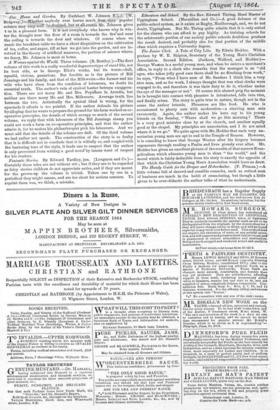The Junior Clerk. A Tale of City Life. By Edwin
Hodder. With a preface by W. E. Shipton, Secretary of the Young Men's Christian Association. Second Edition. (Jackson, Walford, and Hodder.)— George Weston is a model young man, and when he enters a merchant's office, in reply to a clerk who remarks that the manager is an "old ogre, who takes jolly good care there shall be no flinching from work," he says, "From what I have seen of Mr. Sanders I think him a very nice man, and as for work, I always thought that was what clerks were engaged to do, and therefore it was their duty to do it, whether under the eye of the manager or not." Of course this absurd prig the moment he is brought into contact with pleasure is intoxicated, falls into vice, and finally crime. The story is quite true to nature, though not in the sense the author intends. Pleasures are like food. He who is accustomed to plenty oats with moderation—a starving man eats ravenously. Again, the author makes his hero say to his young friends on the Sunday, "Where shall we go this morning ? There is a very good minister close by at the church, and another equally good at the chapel. My principles are unsectarian, and I do not mind where it is we go." We quite agree with Mr. Hodder that such very un- sectarian young men are apt to end in the Temple of Reason. However, it is consoling to know that George Weston after his forgery becomes regenerate through reading a Psalm and lives piously ever after. Mr. Hodder has given an excellent picture of the results of that narrow Evan- gelicalism which educates young men to shun " the world," and the moral which is fairly deducible from his story is exactly the opposite of that which the Christian Young Men's Association would have us draw.






























 Previous page
Previous page